In the News
CALENDAR OF EVENTS Advocacy News (Includes how to reach your legislators) DEP Enforcement Actions In The Berkshire |
Entertaining, Fascinating, and Amusing Presentation on Track & Sign of Invertebrates |
Why Does Energy Efficiency’s Promise Remain Unfulfilled? |
Climate Change and Extreme Winter Weather Are you curious about how this extreme winter weather is related to Global Warming? Dr. Amanda Staudt, climate scientist with the National Wildlife Federation, has reported on how the climate crisis is causing extreme winter weather:
Go here to watch Dr. Staudt explain the connection between rising carbon pollution & extreme winter weather. |
WHY CLEAN UP PCBS IN THE RIVER? We will explore the known health effects of PCBs and the latest up to date information Dr. David Carpenter is an internationally recognized expert in PCBs and public health. He is a neurotoxicologist and professor in the Department of Environmental Health and Toxicology in the School of Public Health at State University of New York, Albany. He has worked successfully with many communities across the country to help them assess the degree of human exposure to a range of contaminants, including vast experience with PCBs (polychlorinated biphenyls). Dr. Carpenter has been an editorial advisor to many scientific journals, hosted a 170 station syndicated Public Health Radio Show, and former Chair of the School of Public Health at SUNY Albany. Prior to joining the University at Albany, Dr. Carpenter was a Research Physician at the Wadsworth Center for Laboratories and Research. Dr. Carpenter received his M.D. at the Harvard Medical School in Boston, Massachusetts. He has 220 publications, 37 reviews and book chapters and 12 other publications to his credit. For more information call Tim Gray Housatonic River Initiative 413-446-2520 |
Project Native Film Festival A collection of award-winning feature and short films to educate, inspire, enrage and engage. Q & A with local experts and filmmakers following films. In honor of Project Native’s 10th anniversary we are hosting a one day 'environmental film festival' on Sunday, March 27, 2011. A variety of films will be shown on a wide-range of environmental topics. Films will range from 90-minute features to a series of short films. Our goal is to not only show the problems facing our world, but to also inspire action for positive change. In an effort to reach a wide and diverse audience the films will be open to the public free of charge. The film festival will be held at two locations in Great Barrington: The Triplex Cinema and Mixed Company Theatre. The two theaters can accommodate 150 individuals between them, which means that, over the course of the day, your business could reach an audience of over 600 people! In addition, Project Native will be sending out press releases to regional print media sources and the radio. Feature films will focus on:
In addition, collections of short films will be shown on: urban homesteading, invasive species, commercial meat industry and over-consumption. In an effort to create an educational event which inspires and supports creative change, Project Native has invited several of the film producers and/or regional experts to conduct Question and Answer sessions following each of the films. Questions & Answer Sessions will be limited to 15 minutes following film. However, recognizing that these films and the topics addressed therein are complex and multi-faceted, we will encourage attendees to continue conversing, brainstorming and digesting at one of several local restaurants. Each host restaurant will provide a space for film festival attendees to mingle, network and ask additional questions of Q & A panel members. Date: Sunday, March 27, 2011 For more information or to become a sponsor contact Project Native. Sincerely, |
Avoiding the Garden-Seed Minefield. As more and more people become aware of the dangers of genetically-modified seeds and the stronghold that Monsanto has on our food supply, Rosemary Wessel has begun collecting information on where to get non-Monsanto-owned varieties. You can read the story on the Hilltown Sustainability Website. There is information on where to find non-GMO seeds and even companies that don't buy any seed owned by Monsanto. Hopefully just in time for spring seed orders. Territorial Seed and Johnny's have both stated that they're interested in breaking ties with Monsanto and it's subsidiary Seminis, but are waiting for customer demand. The story lists how to contact them and make this request. The Creamery in Cummington sells Hart's seed, all GMO-free. Story here. |
Regional Greenhouse Gas Initiative News |
TrekEast: Follow an epic journey for the Eastern Wildway On February 3, 2011, Wildlands Network’s TrekEast,™ a 4500-mile journey for nature by wilderness explorer John Davis, began in Key Largo, Florida. Follow John and learn more about his adventures by reading the TrekEast blog. TrekEast is your chance to participate in one of the largest conservation events of our time! Its mission is to inspire a network of people to help connect the East’s remaining wild places in order to save them. The Wildlands Network vision John will be sharing is an Eastern Wildway, a mosaic of connected habitat stretching from Florida’s Everglades to Canada’s Gaspe Peninsula providing enough space for nature, wildlife and people to thrive. Please Donate, sign up and Become a Trekker, Show Us Your Wild and learn how to Take Local Action to help connect the Eastern Wildway. BEAT supports an Eastern Wildway and hopes to meet up with John when he is in the Northeast on his TrekEast. |
Mass. to conduct radioactive testing in Yankee’s EPZ Monday February 7, 2011 BRATTLEBORO -- The Massachusetts Department of Public Health announced last week that it would begin radiation testing in the seven towns in the Bay State that are in the emergency preparedness zone around Vermont Yankee nuclear power plant. Those towns are Bernardston, Colrain, Gill, Greenfield, Leyden, Northfield, and Warwick. Even though Vermont has had a monitoring program in place since Vermont Yankee started operations in 1972, Massachusetts hasn’t had a similar plan. The decision to start testing for radiation had nothing to do with the discovery of tritium contamination of groundwater beneath Yankee, stated Suzanne Condon, director of the Bureau of Environmental Health, in an e-mail to the Reformer. "The decision ... was the result of meetings held before the tritium issues surfaced at Yankee," she stated. "In 2007, DPH officials met with a group of community advocates and legislative officials who expressed the lack of environmental monitoring in the EPZ communities." <MORE> |
Water Quality Permit for Power Plant Requires them to Close the Loop - no more once through Conservation Law Foundation (CLF) applauded today’s announcement by EPA Region 1 of a revised water quality permit for the GenOn Kendall Cogeneration Plant in Cambridge, MA (formerly known as Mirant Kendall) that will vastly reduce the discharge of heated water into the lower Charles River from the plant, allowing the river ecosystem to return to health and providing hope that the Charles will once again be swimmable and fishable. EPA’s issuance of a revised permit brings to a close a five-year negotiation, in which CLF and the Charles River Watershed Association (CRWA) argued that the plant’s massive water intake from the Charles River and its discharges of heated water back into the river were killing fish, as well as their eggs and larvae, destroying the river ecosystem. The new permit requires the plant to reduce its heat discharge and water withdrawal by approximately 95 percent, and to ensure that any heated discharge does not warm the river enough to cause harm. The plant will meet the new requirements by upgrading its existing “once-through” cooling system, to a new, closed-loop system. Kendall will capture most of the heat generated by the plant and distribute it as steam through a new pipeline to be built across the Longfellow Bridge by the TriGen Corporation over the next several years. The combination of the new co-generation turbine and expanded pipeline will allow Kendall to drastically reduce the amount of water it extracts from the Charles River, take more heat out of the plant, and double the amount of steam it can sell to TriGen to heat buildings in the city of Boston. |
Mt. Tom Power Station Will Pay Penalty for Clean Water Act Violations The Mt. Tom Generating Company, LLC, has agreed to a settlement of $40,814 for violations of the federal Clean Water Act (CWA). The company violated its federally issued permit over a five month period when it was conducting construction work at its coal-fired power plant facility, located in Holyoke, Mass. The company discharges its wastewater to the Connecticut River. Discharges of muddy storm water resulting from construction work in violation of a federal Clean Water Act discharge permit had prompted EPA to file an enforcement action seeking penalties against the company. The company has since terminated the discharge to the river. “All companies that are involved in construction activities play a critical role in protecting our waterways,” said Curt Spalding, regional administrator of EPA’s New England Office. “Protecting water quality in our rivers, lakes and streams means we are protecting the health of our citizens, guarding our natural resources and sustaining vibrant local economies.” Rainwater running off construction sites can carry sediments and other pollutants which contaminate nearby streams, ponds and rivers potentially impacting water quality and wildlife habitats. EPA works to ensure that companies engaging in construction implement protective measures to ensure that damaging discharges to our nation’s waters do not occur. More information: |
WRLF to host open house at Sheep Hill The public is invited to a Winter Open House at Sheep Hill, , a conservation property and the headquarters of the Williamstown Rural Lands Foundation, on Saturday February 26 from 1-3 PM. Activities will include an animal tracking and winter ecology hike, and sledding and snowshoeing on the hill. Inside, families can sit by the fire for reading aloud, winter craft activities, and hot cider and maple treats. Leslie Reed-Evans, Executive Director of the WRLF, describes the Open House as an opportunity for people to become acquainted with the WRLF, Sheep Hill and other conservation properties and trails, and its nature and cultural education programs. The newly-restored barns will also be open for visiting. The WRLF is a non-profit, member-supported land conservation trust dedicated to preserving the rural New England character of Williamstown and its surroundings. Sheep Hill is located on Cold Spring Road (Route 7) one mile south of the Williamstown rotary. For more information: 458-2494 or ruraland@wrlf.org. |
Community Preservation Committee weighing where money will go. Friday February 4, 2011 However, it appears the committee is leaning in favor of the Williamstown Community Preschool’s proposal to purchase the First United Methodist Church on Main Street. Chairman Philip McKnight said Tuesday night the committee will begin discussions and possibly vote on which of seven projects it recommends the town fund on March 1. Committee members questioned the rush in the town possibly purchasing the Wylde property when there are concerns that the land is polluted. "What is the rush?" Committee Member Daniel Gendron asked Conservation Commission Member Harold Brotzman. "Wouldn’t it be more prudent to do this next year? That way you can do a site evaluation." He added he was concerned about giving people access to Bridge’s Pond when there is talk of possible contamination in the pond from heavy metals.<more> |
Conference on River Monitoring and Climate Change in MA Presented by the Massachusetts Rivers Alliance How citizen-based monitoring can help us understand and address the impacts of climate change on our rivers.
If the answer is "yes" to any of these questions, this conference is for you! This conference is presented by the Massachusetts Rivers Alliance in partnership with the MA Department of Fish and Game's Division of Ecological Restoration. Day #1, May 18th will consist of presentations, break-out sessions, and discussions from 9am-4pm at the Trustees of Reservations' Doyle Conservation Center in Leominster, MA. Day #2, May 19th, participants may choose to go on one of two fields trips, to sites in either eastern or western Massachusetts. The conference is funded primarily by a grant from the Massachusetts Environmental Trust. The cost of the conference is $20 per person. |
Let's Improve Our Community. Together! |
|
February EcoUpdates BPI Building Analyst Certification
Green Drinks |
Contaminated Sediments: New Tools and Approaches for in-situ Remediation This webinar will feature SRP grantees Dr. Harold D. May and Dr. Danny Reible. Dr. May, Professor, Microbiology and Immunology, Medical University of South Carolina will present "Integrating Microbial Biostimulation and Electrolytic Aeration to Degrade POPs" and Dr. Reible, Bettie Margaret Smith Professor of Environmental Health Engineering, Department of Civil, Architectural and Environmental Engineering, University of Texas will present "Enhancing Biodegration in Sediment Caps Using Carbon Cloth Electrodes." Dr. May will discuss bioaugmentation of Fox River (WI) sediment contaminated with polychlorinated biphenyls (PCBs) and persistent organic pollutants (POPs), and testing with bioactive granulated activated carbon (GAC) containing PCB dechlorinating and degrading bacteria. He will also describe how electron donors and acceptors for microbial PCB dechlorination and degradation can be delivered electrochemically to further stimulate the biodegradation of these POPs. These methods show significant reductions in the concentration of weathered PCBs. Dr. Reible will show that although sediment capping is normally considered strictly a contaminant containment technology, it can trigger microbial processes to transform or detoxify both inorganic and organic contaminants. He will describe research exploring these microbial processes and ways of improving their effectiveness. The presentation will focus on how to enhance microbial transformation of hydrophobic organic compounds in sediment caps through the use of electrodes to change terminal electron acceptors and redox conditions. For more information and to register, see http://clu-in.org/live . |
Are you a community leader interested in learning more about land conservation and land management? Apply to the Keystone Project! The UMass Keystone Project invests education and reference materials in important, keystone people, those in a position to influence forest conservation decisions. Applicants can own woodlands, be involved in the care and stewardship of a property, or be an involved community leader. Participants in the program are provided an intensive 3-day training and a bag of take-home resources. Topics covered at the training include historical perspectives on land use, forest succession and ecology, forest and wildlife management, land protection tools, and community outreach. In return for the training and take-home resources, graduates of the program, called Keystone Cooperators, agree to return to their communities and advance forest conservation through a project of their choosing. This year's training will be held April 14th - 17th, 2011 at the Harvard Forest in Petersham. The Keystone Project is a competitive program. Applications are due March 3rd, 2011. Learn more about the program and download an application at: www.masskeystone.net |
Food Forum We are really pleased to host the 2nd Annual North Quabbin Food Forum on Feb 26th at the Orange Innovation Center, 131 W. Main St, Orange. This day of workshops and conversation unites residents from our 9-town region to gain practical skills and share ideas towards food resiliency and strong communities. Did you know that WWII home and community victory gardens in the U.S. produced almost 40 billion pounds of vegetables, equal to the total commercial production of vegetables at that time? Fresh healthy food for all, and our ability to survive and thrive in tough times depend on sharing skills that nourish our lives, families, and communities. Food Forum workshop presenters- farmers, gardeners and food enthusiasts- are all residents of North Quabbin towns, with incredible knowledge and experience to share! The event is free, with priority to those who live or work in the North Quabbin Region, and is geared towards adults and interested teens. There is no pre-registration but capacity is limited to 60, first come basis. Please bring a potluck dish or beverage to share for lunch, that doesn't need to be heated and if possible includes a local ingredient. If you don't live locally to come to ours, consider creating a Food Forum event in your own community. Make a list of all the people and organizations with food growing, animal raising, cooking, or preserving skills to share, find a cheap or donated space to hold the event, keep it free and simple, and celebrate the wealth of cultural and agricultural knowledge in your own region! Food for Thought: |
EPA To Develop Regulation for Perchlorate and Toxic Chemicals in Drinking Water In a separate action, the agency is also moving towards establishing a drinking water standard to address a group of up to 16 toxic chemicals that may pose risks to human health. As part of the Drinking Water Strategy laid out by Administrator Jackson in 2010, EPA committed to addressing contaminants as a group rather than one at a time so that enhancement of drinking water protection can be achieved cost effectively. Today’s action delivers on the promise to strengthen public health protection from contaminants in drinking water. |
UPCOMING GRANT OPPORTUNITY TO ALL INTERESTED PARTIES: Section 319 of the Clean Water Act of 1987 established a national program to control nonpoint sources (NPS) of pollution. Each year the Massachusetts DEP issues a Request for Responses (RFR) for competitive projects to be funded through Section 319 grants. This year’s RFR is anticipated be issued on or about April 1, 2011. Proposals will be due on or about June 1, 2011. The RFR will be posted at the Commonwealth’s procurement site, http://www.comm-pass.com under Open Solicitations, Department of Environmental Protection, Professional Services. Two Pre-RFR meetings will be held at MassDEP’s Central Regional Office, 627 Main Street, Worcester, MA. The purpose of each meeting is to review project requirements and eligibility and to discuss FFY ’12 program priorities. Any other aspect of the program may also be discussed. Under state procurement regulations, Department and other EOEEA staff will not be able to discuss projects with proponents once the RFR is issued on or about April 1. Therefore, potential applicants are urged to take advantage of either or both of the Pre-RFR meetings, and all other opportunities to engage 319 program staff in discussion about how to develop eligible, competitive projects, prior to the April RFR issuance. Please note an important change for FFY 2012: Draft NPDES MS4 General Permits and Residual Designation Authority (RDA) permits are now available for several Massachusetts watersheds. The new MS4 permit builds upon the requirements of the previous permit, requiring small MS4s to continue to implement the Stormwater Management Programs required by the previous permits. The new permit contains more specific requirements and best management practice for each control measure. RDA permits also include new requirements that are intended to address stormwater impacts. 319 Guidelines specifically preclude the use of 319 funds to meet conditions of draft or final NPDES permits. Given the detailed nature of the new draft MS4 and RDA permits, MassDEP anticipates that very little 319-eligible implementation work can be found in the NPDES regulated areas. Note: Some portions of MS4 municipalities may fall outside the regulated area. PROJECT ELIGIBILITY CRITERIA Responses to the RFR may be submitted by any Massachusetts public or private organization. Projects from all basins are eligible and encouraged. Projects should be of manageable size, but should strive to be comprehensive projects addressing all major identified nonpoint sources affecting water quality in the watershed or subwatershed. All 319 projects are required to provide quarterly reporting as well as a Final Report. PROJECT TYPES FOR FFY 2012 Competitive projects are typically comprised of one or more eligible activities. The majority of s.319 funding is designated for funding implementation projects in impaired waters. Project evaluation will substantially favor work that is consistent with the Massachusetts Watershed-based Plan and that will result in meeting water quality standards and/or restoring beneficial uses (i.e., in removal of the waterbody from the 303d list, i.e. Category 5 of the Massachusetts 2010 Integrated List of Waters, http://mass.gov/dep/water/resources/tmdls.htm). A. Implementation Projects in Impaired Waters - Preference will be given to projects that propose to implement a combination of structural and non-structural BMPs addressing all impairments and leading to restoration in an impaired watershed or subwatershed. Implementation projects should be of manageable size, but must be comprehensive, striving to address all sources of NPS pollution in the project area. BMPs should be selected for optimal pollutant load removal, emphasizing source reduction. Proposed BMPs must be developed at least to the conceptual design stage, and proposals must contain site specific information to demonstrate that the project is feasible and ready to be constructed within the project timeline. B. Outreach and Education – Outreach and education is often recommended as an effective nonstructural BMP. Successful projects in this category will propose specific outreach and education activities, and will develop and implement an evaluation method to gauge the effectiveness of these activities. A strong technology transfer component must also be included to facilitate the use of project results and deliverables in other watersheds. C. Demonstration Projects – Projects in this category will evaluate new/innovative BMPs, technologies, and/or institutional approaches, and will accelerate the transfer and adoption of these new/innovative BMPs, technology or institutional approaches. Preference will be given to demonstration of technologies that will directly lead to measurable water quality improvements. APPLICATION PROCESS The RFR contains a schedule for each step of the application process. Applications must meet the eligibility requirements and follow the specific format outlined in the RFR. Applications are reviewed and recommended by an internal screening committee comprised of MassDEP Municipal Services and Regional staff, EOEEA staff, and EPA. Once approved by the Commissioner of MassDEP, the list of recommended projects is submitted to EPA. Once the grant application is approved by EPA, the Department begins contract negotiations with the proponents of the funded projects. As a general rule of thumb, 319 grantees can expect funds will become available six to eight months after submitting the initial grant application. Funds are paid on a reimbursement basis, and the Department retains 10% of the award amount until the project is finalized. From fiscal year 1990 through 2011, individual total project costs (grant funds plus match) have ranged from $10,000 up to $500,000. EVALUATION CRITERIA Evaluation criteria include, but are not limited to: nature, extent, severity and understanding of the NPS problem; logical and comprehensive strategy; feasibility and probability of success; projected benefits; local support and participation; interagency participation, cooperation and commitment; local funding; amount of funds requested; consistency with Department and EOEEA goals and priorities; and consistency with the Massachusetts Watershed-based Plan. Project evaluation will substantially favor work that will result in meeting water quality standards and/or restoring beneficial uses (i.e., in removal of the waterbody from the 303d list, i.e. Category 5 of the Final Massachusetts 2010 Integrated List of Waters, http://mass.gov/dep/water/resources/tmdls.htm ). Directions to CERO: http://mass.gov/dep/about/region/centralr.htm To obtain additional program information, indicative summaries of past 319 projects, or a copy of the 319 RFR, click on http://www.mass.gov/dep/water/grants.htm or please call or email Jane Peirce , 319 Program Coordinator at (508) 767-2792 , Jane.Peirce@state.ma.us. Hard copies of the RFR will only be mailed if requested. |
Massachusetts Spring Microloan Deadline: March 4th, 2011 The Carrot Project is pleased to announce that the Strolling of the Heifers Microloan Fund for New England Farmers and the MassDevelopment/Strolling of the Heifers Small Farm Loan Program serving residents of Massachusetts will be accepting prequalified applications for our Spring deadline through March 4th, 2011 for loans of $15,000 or less. There is an additional deadline in the Fall of 2011. For more information, please go to www.thecarrotproject.org/farm_financing or contact Dorothy Suput at 617-666-9637 or at dsuput@thecarrotproject.org. The Carrot Project is also pleased to announce that we are hiring a part-time Program Coordinator! For more information on this position, please see the full project description here. |
Unity Avenue Foundation Grant Guidelines and Procedures I. Guidelines
II. Procedures
III. 2011 Timeline
Proposal summaries must be received (not postmarked) on or before the deadline date. Brad Kruse |
2011 MASS. LAND CONSERVATION CONFERENCE - REGISTER NOW! Register now for the 21st Massachusetts Land Conservation Conference, featuring 30 workshops on all aspects of land conservation. The conference is convened by the Massachusetts Land Trust Coalition and The Trustees of Reservations' Putnam Conservation Institute. This year we are very pleased to welcome co-sponsors Mass Audubon, The Nature Conservancy, The Trust for Public Land, and the Land Trust Alliance. The 2011 Conference Theme is "Climate Change and Land Conservation" with a focus on raising awareness about climate change and ways in which land protection and stewardship can contribute to adaptation and mitigation strategies. Who should attend? Download the 2011 conference brochure and list of workshops here. Let Us Know If You Can Help |
- Home
- Agencies & Regulations
- News
- Issues
- Volunteers in Action
- Donate or Volunteer


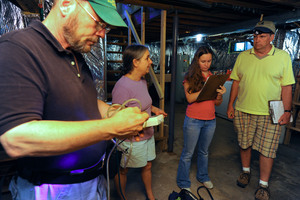 This five-day intensive
This five-day intensive 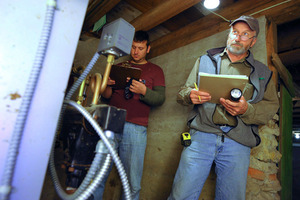 If you couldn't make the Building Analyst training this month, you have another opportunity in
If you couldn't make the Building Analyst training this month, you have another opportunity in 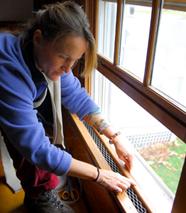 CET is now offering the BPI
CET is now offering the BPI 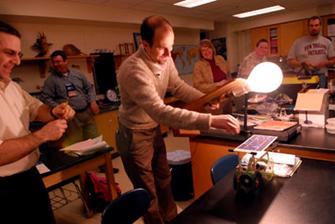 This free Junior Solar Sprint (JSS) workshop will prepare teachers and non-formal educators to lead middle school students through the Junior Solar Sprint experience. The JSS is a highly engaging and successful program where kids design, build and compete with model solar electric cars. Your young engineers will deepen their understanding about solar energy, math, physical science and craftsmanship.
This free Junior Solar Sprint (JSS) workshop will prepare teachers and non-formal educators to lead middle school students through the Junior Solar Sprint experience. The JSS is a highly engaging and successful program where kids design, build and compete with model solar electric cars. Your young engineers will deepen their understanding about solar energy, math, physical science and craftsmanship. It's always the right time to reap the benefits of a home compost system. Okay, so you won't really do much with the rich soil your compost turns into during the winter months, but you'll enjoy fewer trips to the transfer station and reduced costs for waste disposal, because you'll actually be throwing away a lot less all year long. Plus, you won't have to buy bags of topsoil or compost in the spring, because you'll be making your own.
It's always the right time to reap the benefits of a home compost system. Okay, so you won't really do much with the rich soil your compost turns into during the winter months, but you'll enjoy fewer trips to the transfer station and reduced costs for waste disposal, because you'll actually be throwing away a lot less all year long. Plus, you won't have to buy bags of topsoil or compost in the spring, because you'll be making your own.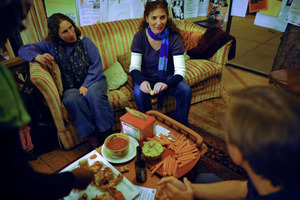 We've said it before and we'll say it again: the drinks aren't green, but the people sure are! Come and rub elbows with like-minded folk at these low-key
We've said it before and we'll say it again: the drinks aren't green, but the people sure are! Come and rub elbows with like-minded folk at these low-key